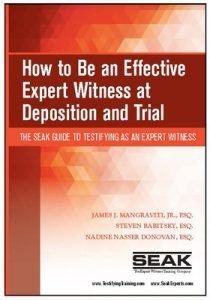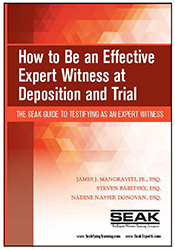
Jim, could you please talk about the core areas of depositions and what expert witnesses need to know in each of these core areas?
Jim Mangraviti: Sure. First of all in a deposition, one of the intimidating things about a deposition is that they can kind of ask you anything. But when we’re preparing someone for a deposition, we like to talk about the following five core areas.
Number one, qualifications: you need to be able to justify why you’re qualified to give each any every opinion that you’re giving in the case.
Number two, the lawyers are going to be fishing around to try and probe as to bias, as to your bases, your potential bases. You need to be prepared for those questions. Money is going to be part of that.
Number three, not surprisingly, the lawyers are going to want to know what you’re opinions are, and what you’re opinions are not. You’ve got to be ready to rock and roll on that.
Number four, they want to know how you got to those opinions. That is your methodology, and if you’re methodology is not up to snuff, your whole opinion can get thrown out. That’s what we talk about with Daubert Rule 702, so you have to be careful with that.
And finally, your opinion is only as good as the facts of the investigation upon which it is based. So if you’re going to be deposed, you will be asked about the facts, the assumptions, everything that you’re basing everything on. So those are the five things I’d say, Steven, that you’ve really got to be prepared to answer in any deposition and of course it’s more complicated than that, but those are the five that I would focus on.
Steve Babitsky: Can we try now to demonstrate those topics?
Jim Mangraviti: Sure, have a seat. Okay. What we’re going to do now is we’re going to demonstrate the five areas of inquiry that we just talked about and the first area we’re going to talk about is qualifications. And you as an expert witness need to be prepared to answer why you’re qualified in the way that Steve and I teach people, is we try to think in bullet points. Think about your answer on an index card with bullet points so you can really spell out those specific things that make you qualified. So Steve, this case involves worker’s compensation, is that right?
Steve Babitsky: Yes it is.
Jim Mangraviti: Can you please tell me all the reasons that you feel you’re qualified to give an opinion in this case involving worker’s compensation?
Steve Babitsky: Well, first I was a worker’s compensation attorney for 20 years. Secondly, I wrote a national worker’s compensation newsletter which was distributed across the country. I’ve taught worker’s compensation nationally, for physicians, attorneys, etcetera, through the United States. I also have taught related areas like IME exams and other areas. And I’ve testified as an expert witness in a significant case involving the constitutionally of the Texas Worker’s Compensation Act. So those are just some of the reasons why I’m qualified in this case.
Jim Mangraviti: Okay, excellent. Excellent answer again, he was ready to go. So why you are qualified is an easy question under two circumstances, and these are the things you need to watch out for. Number one, you need to be qualified. And number two you need to be prepared. You need to be prepared to spit those things out. Okay. Which, I think he did an excellent job at.
Now another thing we tell experts is another reason you want to put your qualifications in your report besides it being a good idea, it can be a nice cheat sheet if you forget something, you can refer to your report. So, excellent answer. Now we’re going to talk biases. As I talked about before, one of the biases that you’re going to get at every deposition is about the money. Okay. So, Mr. Babitsky, how much are you being paid for your time involved in this case?
Steve Babitsky: $500 an hour.
Jim Mangraviti: Okay. And what percentage of your income traditionally the last year, the last two years comes from expert witness work? Forensic work?
Steve Babitsky: It’s approximately 40% of my income.
Jim Mangraviti: Okay, two excellent answers. Why were they excellent? Because A, he knew the answers and he wasn’t defensive or evasive. Excellent, so, simple questions. Now let’s talk about opinions, all right? Now Mr. Babitsky, you wrote a report in this case, is that right?
Steve Babitsky: I did.
Jim Mangraviti: Does that report contain all of the opinions that you will be offering at trial on this case?
Steve Babitsky: It contains opinions that I will be offering at trial, it’s not all the opinions for various, several reasons. Number one, I continue to work on the case. Number two, additional information is coming in, which I may have another opinion on. And number three, will depend on the question you ask me. If you ask me different questions, I might have new opinions.
Jim Mangraviti: All right, well let me ask you this. You’re working for Attorney Gossios back there?
Steve Babitsky: Yes.
Jim Mangraviti: If you do additional working on this case and form additional opinions that you intend to give at trial, will you agree to tell Attorney Gossios so she can tell me?
Steve Babitsky: Yes.
Jim Mangraviti: Okay. Basically that’s what you’re going to get, and you’re going to get all kinds of questions about opinions. Now about methodology, methodology is a big deal for a couple of reasons. Number one, if your methodology is no good, the trial judge acting as a gatekeeper under the Daubert and Rule 702 can throw your testimony out, which does not look good on a resume. Even if the judge doesn’t throw you out, having a lousy methodology is not going to help your credibility with the jury, okay? Now, as I understand it, you’re an appraiser Mr. Babitsky. Is that right?
Steve Babitsky: I am.
Jim Mangraviti: And you use the comparable sales methodology to come up with an evaluation in this case, is that right?
Steve Babitsky: Correct.
Jim Mangraviti: Can you please tell me all of the reasons why you feel that that is a reliable methodology?
Steve Babitsky: Well, the main reasons are as follows, number one, by the way I did a site visit and number two the comparables are the best guide for what the price of the property is. What I did is I searched out comparable sales, I found six properties very, very similar to the property in question. I researched the differences. I did site visits. I looked at the sales price. I looked at the differences. I made adjustments, and based upon that, that methodology I came up with the evaluation in this case.
Jim Mangraviti: And is comparable sales a methodology that is generally accepted in the field of appraisal?
Steve Babitsky: It is.
Jim Mangraviti: Can you explain, or give me examples of that, like explain further on that?
Steve Babitsky: Sure. Comparable sales is the standard by which most appraisers utilize in making these appraisals. And it’s one of the various ways to come up with an evaluation in a case like this.
Jim Mangraviti: Okay. You’re going to be asked about your methodology. They don’t want to just know what your answer is, but they want to know how you got there. And again, it could be to throw out your testimony later or just to beat you up, so you need to be able to rock and roll to explain not just where you got where your opinion is but how you go there and to justify that that was a reliable methodology that you used.
Finally, let’s talk about assumptions. Okay. Or facts and bases, similar type thing, because you have garbage in, you got garbage out. Now as I understand it Mr. Babitsky, your opinion is based on part on the testimony of Mr. Baldwin. Is that right?
Steve Babitsky: Yes.
Jim Mangraviti: And you reviewed Mr. Baldwin’s deposition, did you not?
Steve Babitsky: I did.
Jim Mangraviti: All 125 pages, is that right?
Steve Babitsky: I did.
Jim Mangraviti: All right. Now let’s assume Mr. Baldwin was lying in his deposition. Wouldn’t that change your opinion?
Steve Babitsky: It would depend specifically on what he lied about. So, for example this is an auto accident case. If he lied and instead of saying he was 64 years old and in fact he was 65 years old that wouldn’t change my opinion. So, it would depend specifically on what he lied about.
Jim Mangraviti: Excellent answer. He’s giving ground but he’s also not giving me too much. When I say, would that change your opinion, he said it depends. Fair enough, it depends on what Mr. Baldwin might be lying about. Thank you.
Steve Babitsky: Jim, how does SEAK help expert witnesses excel at their depositions?
Jim Mangraviti: Thanks Steve. SEAK is an expert witness training company, this is what we do and we have a number of free expert witness resources. We also have a number of books for expert witnesses that we’ve published which are available on our website that are very helpful. We conduct expert witness training workshops at various places in the country and at various times over the course of the year. And finally, you, myself, and Attorney Donovan work one-on-one with witnesses to prepare them for their deposition and help train them to be a better expert witness at deposition.

